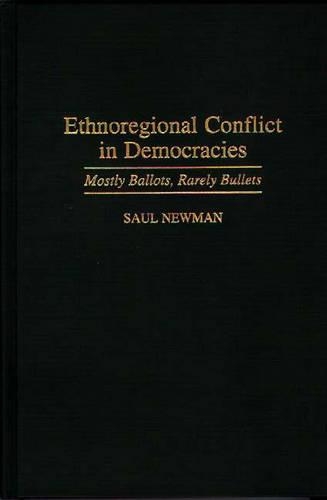
Ethnoregional Conflict in Democracies: Mostly Ballots, Rarely Bullets
(Hardback)
Publishing Details
Ethnoregional Conflict in Democracies: Mostly Ballots, Rarely Bullets
By (Author) Saul Newman
Bloomsbury Publishing PLC
Praeger Publishers Inc
16th May 1996
United States
Classifications
Tertiary Education
Non Fiction
Human rights, civil rights
Ethnic studies / Ethnicity
323.11
Physical Properties
Hardback
296
Description
Most advanced industrial democracies have been successful in controlling ethnic political conflicts peacefully. This book examines ethnoregional conflicts in seven ethnoregions - in Scotland, Flanders, Wallanio, Brussels, Quebec, Northern Ireland, and the Basque region of Spain. It explains what factors determine electoral support for ethnoregional parties, why in some cases electoral conflict has co-existed with ethnic violence and why there appears to be an inverse relationship between electoral success and political success among many ethnoregional parties. As ethnic conflicts - peaceful and violent - continue to rage around the world, this study should be of interest to scholars and students in comparative politics and ethnic studies.
Reviews
"A solid and ably managed study that considerably enhances our understanding of those ethnoregional movements that exerted such a substantial influence on the state of the state in the developed Western world during the past quarter century."-Joseph R. Rudolph, Jr., Professor of Political Science Towson State University
"Newman demonstrates an impressive knowledge of the political economy of the five cases he analyses in this volume. He successfully anchors them in a common theoretical framework that lends a genuine comparative quality to his explanation of ethnic conflict."-Milton J. Esman John S. Knight Professor of International Studies, Emeritus Cornell University
"Saul Newman has written an informative and theoretically engaging book that returns to a classic question: "Do contemporary social changes lead to political instability" Newman makes a provocative argument that challenges the post-materialist vision presumed by many scholars today and that places government decisions at the center of political history. Newman's comparative study is so empirically rich and theoretically explicit that it undoubtedly will inspire a broad range of thinkers interested in either European history, contemporary nationalist movements, or the political consequences of social change."-Cyrus Ernesto Zirakzadeh, Associate Professor of Political Science University of Connecticut
[T]his book is an important addition to the research literature on ethnoregional conflicts in democratic systems. Readers will benefit from the case studies and the author's theoretical approach. Newman does an effective job of arguing the connections among modernization, ethnic identities, politial ideologies, and existing political institutions and practices. There is much that can be gleaned from this work.-American Political Science Review
"This book is an important addition to the research literature on ethnoregional conflicts in democratic systems. Readers will benefit from the case studies and the author's theoretical approach. Newman does an effective job of arguing the connections among modernization, ethnic identities, politial ideologies, and existing political institutions and practices. There is much that can be gleaned from this work."-American Political Science Review
"[T]his book is an important addition to the research literature on ethnoregional conflicts in democratic systems. Readers will benefit from the case studies and the author's theoretical approach. Newman does an effective job of arguing the connections among modernization, ethnic identities, politial ideologies, and existing political institutions and practices. There is much that can be gleaned from this work."-American Political Science Review
Author Bio
SAUL NEWMAN is Associate Professor of Government at American University. His articles have appeared in journals such as World Politics, Ethnic and Racial Studies, Regional Politics and Policy, and Nationalism and Ethnic Politics.
